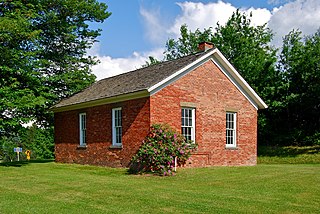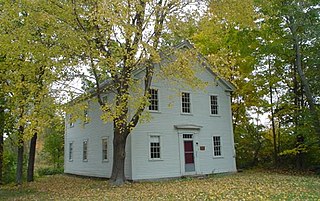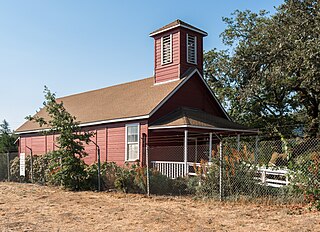
Chandler is a city in Maricopa and Pinal counties, Arizona, United States, and a suburb in the Phoenix-Mesa-Chandler Metropolitan Statistical Area (MSA). It is bordered to the north and west by Tempe, to the north by Mesa, to the west by Phoenix, to the south by the Gila River Indian Community, and to the east by Gilbert. Most of the city is located in Maricopa County, while a portion of it in the south is in Pinal County. As of the 2020 census, the population of Chandler was 279,458, up from 236,123 at the 2010 census.

Goodsprings is an unincorporated community in Clark County, Nevada, United States. The population was 229 at the 2010 census.

The Goodsprings Cemetery consists of 1.33 acres (0.54 ha) and is an old, continuing cemetery located southwest of Las Vegas, Nevada seven miles (11 km) from Jean and just before entering the town of Goodsprings.

Anderson Schoolhouse is a registered historic building near Ashland, Ohio, listed in the National Register of Historic Places on 1977-03-25. It is located at 1202 US 42 South, in Milton Township, Ashland County, Ohio. It was known as the No. 5 district out of seven in the township.

The River Road School is located in Lyndhurst, Bergen County, New Jersey, United States. The schoolhouse was built in 1893 and is the home of the Lyndhurst Historical Society. The schoolhouse was added to the National Register of Historic Places on November 11, 1977.

The District #6 Schoolhouse, also known locally as the Little Red Schoolhouse located in Brunswick, New York, United States, is a one-room schoolhouse built c. 1830 or 1837 that was home to grades one through eight until the consolidation of Brunswick (Brittonkill) Central School District in 1952. It was added to the National Register of Historic Places (NRHP) on July 3, 2008 and a dedication ceremony for the accomplishment was held on June 12, 2009.

The District #2 Schoolhouse, known locally as the Garfield School and also known as Brunswick District No. 2 School, located in Brunswick, New York, United States, is a two-room schoolhouse built and opened in 1881. It hosted local students until the consolidation of Brunswick (Brittonkill) Central School District in the mid-1950s. It was added to the National Register of Historic Places (NRHP) in 1988, becoming the first building in the Town of Brunswick to be added to the Register. It is the current home of the Brunswick Historical Society.

District #10 Schoolhouse is a historic One-room school located at Hartland in Niagara County, New York. It is a one-story cobblestone structure built about 1845 in the Greek Revival style. It features smooth, slight irregularly shaped, variously colored cobbles in its construction. It operated as a school until 1947 when it was converted into a private residence. It was recently acquired by the Hartland Historical Society. It is one of approximately 47 cobblestone structures in Niagara County.

Stone Arabia School, also known now as Stone Arabia Schoolhouse Museum, was built in 1854 in Cicero, New York. It is significant as "an outstanding example of a mid-nineteenth century modest Greek Revival style one-room schoolhouse". It was listed on the National Register of Historic Places in 2007.

Roe Cobblestone Schoolhouse is a historic one room school located at Butler in Wayne County, New York. The cobblestone building is a one-story, 28 feet long by 22 feet deep, three bay wide structure. It was built about 1820 and is constructed of irregularly shaped, multi-colored, field cobbles. It ceased to function as a school in 1932, used as a single family residence, and is now operated as a schoolhouse museum by the Butler Historical Society, which also operates the Butler Church Museum. Both museums are open on the first Saturday of the month from May through October.

The Square Schoolhouse is a historic schoolhouse at the junction of New Hampshire Route 156 and Ledge Hill Road in Nottingham, New Hampshire. Built about 1850, it is one of the best-preserved mid-19th century schoolhouses in southern New Hampshire. It served as a school until 1920, and is now a local museum. It was listed on the National Register of Historic Places in 1980. It is named not for its shape, but for its location in Nottingham Square.

Indian Rock Schoolhouse, also known as District 3 Schoolhouse or Webutuck Country Schoolhouse, is located on Mygatt Road in the hamlet of Amenia, New York, United States. It is a wooden one-room schoolhouse built in the mid-19th century in accordance with a standard state plan for small rural schools that reflected contemporary educational reform movements.
The Clinton Historical Society, in Clinton, Oneida County, New York, is a historical society housed in a historic building. The building, built in 1832, is also known as Old Baptist Church of Clinton, and is listed on the National Register of Historic Places.
The Manhattan School is a historic schoolhouse located on Gold Street in Manhattan, Nevada. Built in 1913, the school was the third in Manhattan. The first school had opened in 1906, shortly after a gold rush in the community, and the second opened in 1908; however, by 1911 the local school district had 65 students and had outgrown its original buildings. Manhattan's voters unanimously passed a bond proposal for the new school the following year. Area contractor Angus McDonald built the school the year after. Upon its completion, a benefit party was held at the school to provide money for its furniture and a piano.

The High Tops School, also known as Schoolhouse No. 9, is a historic school building at the corner of Reynolds and River roads in Westmoreland, New Hampshire. Built in 1789 and remodeled in 1846, it is one of a small number of district schoolhouses in the region to survive demolition or adaptation to residential use. The building was listed on the National Register of Historic Places in 1984, and the New Hampshire State Register of Historic Places in 2007. It is now owned by the Westmoreland Park Hill Meeting House and Historical Society.

The Braintree School, also known as the District 8 School, is a historic school building at 9 Warren Switch Road in Pawlet, Vermont, United States. It is a single-room district schoolhouse built in 1852, and used as a school until 1934. It is now a museum property owned by the Pawlet Historical Society, and was listed on the National Register of Historic Places in 2010.

The Lund Grade School, at 30 W Center St. in Lund, Nevada, was listed on the National Register of Historic Places in 2018.

The Con Creek School, in Mendocino County, California near Boonville, California, was built in 1877. The school and another contributing building were listed on the National Register of Historic Places in 1979.

A two-room schoolhouse is a larger version of the one-room schoolhouse, with many of the same characteristics, providing the facility for primary and secondary education in a small community or rural area. While providing the same function as a contemporary primary school or secondary school building, a small multi-room school house is more similar to a one-room schoolhouse, both being architecturally very simple structures. While once very common in rural areas of many countries, one and two-room schools have largely been replaced although some are still operating. Having a second classroom allowed for two teachers to operate at the school, serving a larger number of schoolchildren and/or more grade levels. Architecturally, they could be slightly more complex, but were still usually very simple. In some areas, a two-room school indicated the village or town was more prosperous.

Passtown Elementary School is a historic American school building in Valley Township, Chester County, Pennsylvania. Built in 1923 and expanded in 1950, this racially segregated school anchored the mostly African American Hayti neighborhood, just west of the city of Coatesville. Passtown was listed on the National Register of Historic Places on June 13, 2022.


















